新编英语语法教程Pronouns
英语语法讲解-代词
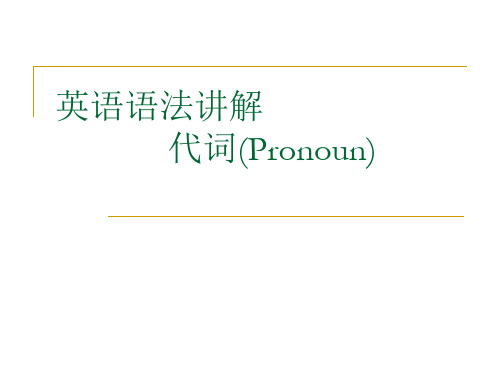
2) 先行项为某些并列结构时代词的选择: 根据该并列结构的单、复数意义来决定代词以 及相应限定词的单、复数形式: My friend and roommate has agreed to lend me his car. My friend and my roommate have agreed to lend me their cars.
代词及其先行项的“性”的一致: 阳性masculine gender—man, father, son, husband 阴性feminine gender—woman, mother, daughter, wife 中性neutral gender—book, desk, ship, car 通性common gender—student, teacher, doctor, infant 现代英语的代词体系包含了“性”的标记:单 数第三人称代词、物主代词、反身代词以及相 应的限定词。使用时要与先行项保持“性”的 一致。
注意: 1. 先行项为every-, some-等复合词时代词的选择: 1) 当先行词为 everyone, everybody, no one, nobody, anyone, anybody, someone, somebody 等复合词时,代词及相应的限定词通常按照语法一致原则用单数形式。 Anybody can attend the meeting if he is interested. Everybody talked at the top of his voice. If anyone calls, tell him I’ll be back later. 但是,非正式语体中,也可以根据意义一致的原则,用复数代词: Someone left their umbrella behind yesterday. Would they please collect it from the office? If anybody wants to give their name for the trip to Scotland, will they please do it before lunchtime? No one could have blamed themselves for that. 尤其当先行项为everybody, everyone时,其后用复数代词还比较自然。 Everyone was clapping their hands. Did everybody leave the dance early because they weren’t enjoying themselves? 当先行项为everything, anything, something, nothing时,随后的代词以及相应的 限定词一般只按语法一致原则用单数形式: Anything on the table can be thrown away, can’t it?
语法教程--Pronouns,代词
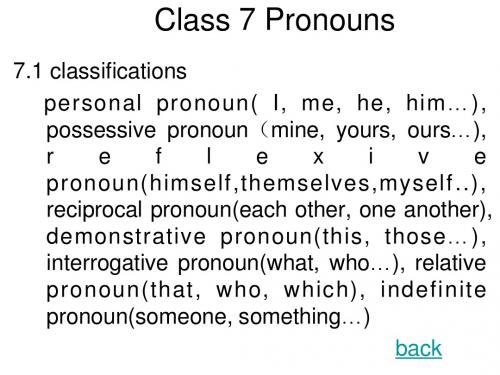
c. some common gender nouns such as “baby, infant, and child” may be referred to either by a personal or by a non-personal pronoun. If we do not know or interested in the sex, we can use “it”. If we are aware of the sex, we can use “he” or “she”. E.g.
★ Anybody can attend the meeting if he is interested. ★ Everybody talked at the top of his voice. ★ Everyone was clapping their hands.
b. As to “everything, something, anything and nothing”, the pronoun and corresponding determiner can only take the singular form. E.g. ★ Anything on the table can be thrown away, can’t it? 2. Pronoun concord with coordinate construction as antecedent. When the antecedent is a coordinate construction, the number forms of the pronoun and corresponding determiner are generally determined by the plural or singular meaning of the construction. E.g. ★ My friend and roommate has agreed to lend me his car.
大学语法之---pronouns
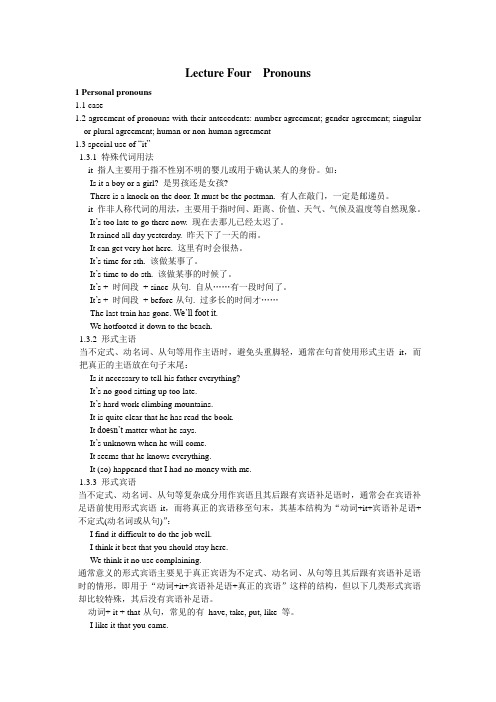
Lecture Four Pronouns1 Personal pronouns1.1 case1.2 agreement of pronouns with their antecedents: number agreement; gender agreement; singular or plural agreement; human or non-human agreement1.3 special use of “it”1.3.1 特殊代词用法it 指人主要用于指不性别不明的婴儿或用于确认某人的身份。
如:Is it a boy or a girl? 是男孩还是女孩?There is a knock on the door. It must be the postman. 有人在敲门,一定是邮递员。
it 作非人称代词的用法,主要用于指时间、距离、价值、天气、气候及温度等自然现象。
It’s too late to go there now. 现在去那儿已经太迟了。
It rained all day yesterday. 昨天下了一天的雨。
It can get very hot here. 这里有时会很热。
It’s time for sth. 该做某事了。
It’s time to do sth. 该做某事的时候了。
It’s + 时间段+ since-从句. 自从……有一段时间了。
It’s + 时间段+ before-从句. 过多长的时间才……The last train has gone. We’ll foot it.We hotfooted it down to the beach.1.3.2 形式主语当不定式、动名词、从句等用作主语时,避免头重脚轻,通常在句首使用形式主语it,而把真正的主语放在句子末尾:Is it necessary to tell his father everything?It’s no good sitting up too late.It’s hard work climbing mountains.It is quite clear that he has read the book.It doesn’t matter what he says.It’s unknown when he will come.It seems that he knows everything.It (so) happened that I had no money with me.1.3.3 形式宾语当不定式、动名词、从句等复杂成分用作宾语且其后跟有宾语补足语时,通常会在宾语补足语前使用形式宾语it,而将真正的宾语移至句末,其基本结构为“动词+it+宾语补足语+不定式(动名词或从句)”:I find it difficult to do the job well.I think it best that you should stay here.We think it no use complaining.通常意义的形式宾语主要见于真正宾语为不定式、动名词、从句等且其后跟有宾语补足语时的情形,即用于“动词+it+宾语补足语+真正的宾语”这样的结构,但以下几类形式宾语却比较特殊,其后没有宾语补足语。
pronouns

4. the other/others/the others
★ the other
1. 特指两个中的另一个
* He has two sons. One is a worker, the other is a doctor.
2. 修饰名词,特指另一个、另一些
* Tom likes swimming, and the other
词
第16页,共36页。
几组在用法上容易混淆的不定代词
1.some/any
★ some(一些,某)一般用于肯定句中 * There are some flowers in front of
the house. ★ any(一些,任何)多用于疑问句和否定句
* Do you have any picture-books?
第28页,共36页。
★ either “两者中任何一个”,作主语时
谓语用第三人称单数; 作定语时后跟名词单数
* There are trees on either side of the street.
= There are trees on both sides of the street.
第29页,共36页。
boys in his class like swimming, too.
第21页,共36页。
★others泛指其他的人或物
* He often helps others.
* Some are playing basketball, others are
playing football.
★the others 特指确定范围内剩下的全部人或
home to school.
代词pronouns
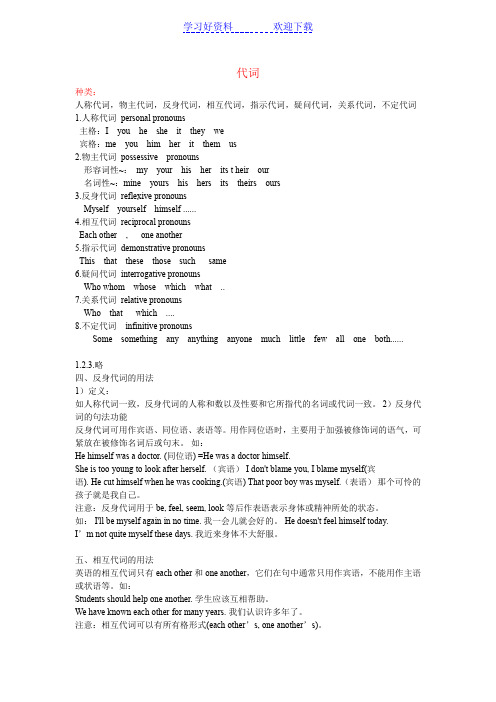
代词种类:人称代词,物主代词,反身代词,相互代词,指示代词,疑问代词,关系代词,不定代词1.人称代词personal pronouns主格:I you he she it they we宾格:me you him her it them us2.物主代词possessive pronouns形容词性~:my your his her its t heir our名词性~:mine yours his hers its theirs ours3.反身代词reflexive pronounsMyself yourself himself ......4.相互代词reciprocal pronounsEach other , one another5.指示代词demonstrative pronounsThis that these those such same6.疑问代词interrogative pronounsWho whom whose which what ..7.关系代词relative pronounsWho that which ....8.不定代词infinitive pronounsSome something any anything anyone much little few all one both......1.2.3.略四、反身代词的用法1)定义:如人称代词一致,反身代词的人称和数以及性要和它所指代的名词或代词一致。
2)反身代词的句法功能反身代词可用作宾语、同位语、表语等。
用作同位语时,主要用于加强被修饰词的语气,可紧放在被修饰名词后或句末。
如:He himself was a doctor. (同位语) =He was a doctor himself.She is too young to look after herself. (宾语) I don't blame you, I blame myself(宾语). He cut himself when he was cooking.(宾语) That poor boy was myself.(表语)那个可怜的孩子就是我自己。
新编英语语法教程PronounsPPT课件
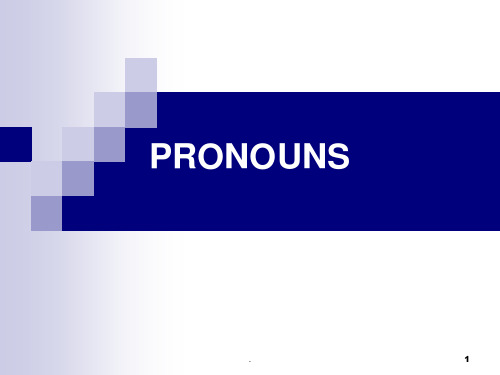
When it comes to making a conscious effort to help keep a public place clean, most people just don’t make the effort. I’m a maintenance man for a department store. If you did make the effort help keep the public place where I work clean, we probably wouldn’t have a job.
Wells is one of the editors who always __(take, takes) a leading role in ____(his, their) community.
Dictatorship is the one of many evils which __(tend, tends) to perpetuate __(itself, themselves).
see Exercise 8C
.
11
Concord in gender
GENDER?
masculine, feminine, neuter, common
It is a set of grammatical forms of nouns (pronouns), determiners and adjectives that tell of the distinctions of sex or attribute.
新编英语语法教程PPT课件
a word or phrase that describes or limits the meaning of another word in a sense
Sense and voice
Sense
indicates when an action or state occurs (past, present, or future)
Introduce clauses that modify nouns or pronouns (e.g., "who," "which," "that")
Used to ask questions about nouns or pronouns (e.g., "who," "what," "which")
Voice
indicates which subject of the presence performs the action (active voice) or receives the action (passive voice)
Subjunctive mood
Subjunctive mood
03 Nouns and Pronouns
Types and Usage of Nouns
Generic names for people, places, or things (e.g., "dog,"
"city")
Co mm on No uns
Refer to ideas, concepts, or qualities
Background
代词 (Pronouns) 知识点.
代词(Pronouns) 知识点‖代词概述‖代词是代替名词及名词作用的短语或句子的词。
代词根据其用法特点可分为人称代词、物主代词、指示代词、反身代词、相互代词、疑问代词、关系代词、不定代词等如:She sings better than me. 她比我唱得好。
(人称代词)Our room is bigger than yours. 我们的房间比你们的大。
(物主代词)Go and wash yourself, Tom. 去洗一洗,汤姆。
(反身代词)We can help one another. 我们可以互相帮助。
(相互代词)This river is longer than that one. 这条河比那条河长。
(指示代词)What are you doing over there? 你们在那边做什么? (疑问代词)I don't know who is in the room. 我不知道谁在房间里。
(关系代词)Money isn't everything. 金钱不是万能的。
(不定代词)1. 代词的概念与分类一、人称代词是表示"我"、"你"、"他"、"她"、"它"、"我们"、"你们"、"他们"的词。
人称代词有人称、数和格的变化,见下表:数单数复数格主格宾格主格宾格第一人称I me we us第二人称you you you you第三人称he him they themshe her they themit it they them例如:He is my friend.他是我的朋友。
It's me.是我。
二、物主代词是表示所有关系的代词,也可叫做代词所有格。
物主代词分形容性物主代词和名词性物主代词两种,其人物和数的变化见下表。
新编英语语法教程第五版 4 Noun and noun phrases
Robert loves this film very much. (Object)
John is a lovely boy. (Subject Complement) They elected him the director. (Object
Derivative noun: greatness, carelessness
(2) In terms of lexical meaning Proper N N
Thomas Edison, the Great Wall, WTO, VIP, DIY, ISBN, MVP, UNESCO, APEC, OPEC Individual N: bag, pen, wallet, dictionary, fan, jacket, skirt, etc. Common N Collective N: furniture, family, police, committee, foliage, etc. Material N: air, snow, bread, rice, water, milk, etc. Abstract N: beauty, glory, etc.
Usually proper nouns have no plural forms, for they
refer to a unique person or place, except for proper names like United States, United Nations, the Netherlands.
more of a/an + n….指数量或程度上“更(像/是 )……”,表示更具有某种特质,相当于 more like a (n)…,常作宾语或表语。 more of a(n) A than a(n) B 表示否定B,肯定A 或在肯定B的基础上,更强调A,意为“与其说是 B,还不如说是A;不是B,而更像是A;与B相比 ,更像A”。 He is more of a teacher than a scholar. 与其说 他是一位学者,倒不如说他是一位教师。
1.1Pronouns
(3)作表语
He is not himself. You don't look like yourself.
拓展体会:
反身代词可用来对前面的名词或代词加以强调,这样也叫做 强调代词。 Traslate those sentences: John himself(=and nobody else) designed the house. John himself(=without help) did the exercise.
(5)比较it和one it用来指特定的东西(=the+名词);而one则用于替代不特 定的东西(a,an+名词),one也有前加the表特定但是口语 中用法,书面常用that和those
2.this 和that连用表示随随便便,东一下,西一下
EG:Don't run this way and that way. He falls in love with this girl or that .
3.用在时间组中,表示特定意义
Be gone this minute(=at once).立即消失。 He has won for this time(=at least this occasion)
(
a friend of mine 的用法
句型:a(an,this,that,some,no)等+名词+of+名词性所有 格。按此句型“我的朋友之一”应译为a friend(名词)of mine(名词 性所有格)。 A friend of ours is coming soon. 我们的一个朋友马上就来。 That watch of hers is beautiful. 她的表很漂亮。(暗示她有许多表) 注意: 冠词a(an,the)和this,that,some等词后不能加所有格。 (×)a my friend
- 1、下载文档前请自行甄别文档内容的完整性,平台不提供额外的编辑、内容补充、找答案等附加服务。
- 2、"仅部分预览"的文档,不可在线预览部分如存在完整性等问题,可反馈申请退款(可完整预览的文档不适用该条件!)。
- 3、如文档侵犯您的权益,请联系客服反馈,我们会尽快为您处理(人工客服工作时间:9:00-18:30)。
Personal pronouns:
I/ me, we/ us, you, he/ him, she/ her, it,
they/ them
Possessive pronouns:
my/ mine, our/ ours, you/ yours, his/
his, her/ hers, its/ its, their/ theirs
subjective case -------subject position objective case ------ other positions
2. minor sentence 3. everybody/ nobody + but/ except +
pronouns
Informality
Reflexive pronouns:
Reciprocal pronouns:
each other(‘s), one another(‘s)
Demonstrative pronouns:
this, that, these, those, it, such, same
This book is yours, and that is mine.
other night.
Concord in number
NUMBER: Antecedent: everyone, anyone, everybody,
anybody, no one, nobody, someone, somebody Pronoun?
The cast is giving ___ (its, their) bester, either.
I have do much work this morning.
He has done much for his wife.
Concord
ANTECEDENT a word, phrase or sentence that is represented by
see Exercise 8C
Concord in gender
GENDER? masculine, feminine, neuter, common It is a set of grammatical forms of nouns
(pronouns), determiners and adjectives that tell of the distinctions of sex or attribute. In modern English, only pronouns and nouns have gender distinctions.
PRONOUNS
1. classification 2. concord 3. case forms 4. reflexive pronouns
Pronoun?
pro- ? a. supporting or approving of something. b. doing something instead of someone.
Comparative clause She is prettier than __(I/ me) He is clever than __ (we/ us) all.
Minor sentence
Does anyone know where Tom lives? -- __(I/ me). / -- __ (I/ me) do.
pronouns. One must remember to remain very still when he
attends a concert. Professor Smith and I went to the States together. We
stayed there for three weeks. I recognized one of the girls, but I didn’t speak to her. I recognized one of the girls who were caroling the
1. Just between you and (I, me) that man is crazy.
Dictatorship is the one of many evils which __(tend, tends) to perpetuate __(itself, themselves).
Either John or James, who are twins, __(have, has) left (his, their) sweater.
someone; any, anything, anybody, anyone; no,
nothing, nobody, no one, none; everything,
everybody, everyone, each; much, many, little,
a little, few, a few, other, another, all, one, both,
General rule
It is difficult to predict __ (who, whom) will win the election.
Who’s knocking the door? – it’s __ (I/ me). It was __ (I/ me) who am to blame. It was__ (I/ me) that they were talking about. Stanley had no doubt about __(who, whom) would be
Interrogative pronouns:
what
who(ever), whom(ever), whose, which,
Relative pronouns:
that, as
who(ever), whom(ever), whose, which,
Indefinite pronouns:
some, something, somebody,
prep. complementation, etc. The woman __(who/whom) we thought to be
__(she, her) turned out to be her sister. The woman __ (who/ whom) we thought
might be __ (she. her) turned out to be her sister.
Everyone thinks ____ (he is, they are )the centre of the universe.
Wells is one of the editors who always __(take, takes) a leading role in ____(his, their) community.
Everybody/ nobody + but/ except…
Nobody except __ (he/ him) can solve our problems.
Everybody agreed to our proposal but __(he/ him).
I interviewed everybody but __(he/ him).
Nouns of common gender
man They were pronounced man and wife at the
altar. We hold these truths to be self-evident, that all
men are created equal,… If a student needs advice about careers,
Pronouns are words used instead of nouns, thus have nominal functions.
Classification
personal, possessive, reflexive, reciprocal, demonstrative, interrogative, relative, indefinite pronouns.
elected minister of defense. Everybody, including __ (I, me), failed the test. She knows me better than __(he? him?).
Exceptions to general rule
1. informality
Concord in person
When it comes to making a conscious effort to help keep a public place clean, most people just don’t make the effort. I’m a maintenance man for a department store. If you did make the effort help keep the public place where I work clean, we probably wouldn’t have a job.
believe will be glad to help you? The woman __ (who/ whom) we thought
might be her turned out to be her sister.
Informality
Cleft sentence It was __ (he/him) who did it.
Interrogative clause __ (who/ whom) did you want to nominate? I don’t know __ (who/ whom) you want to
